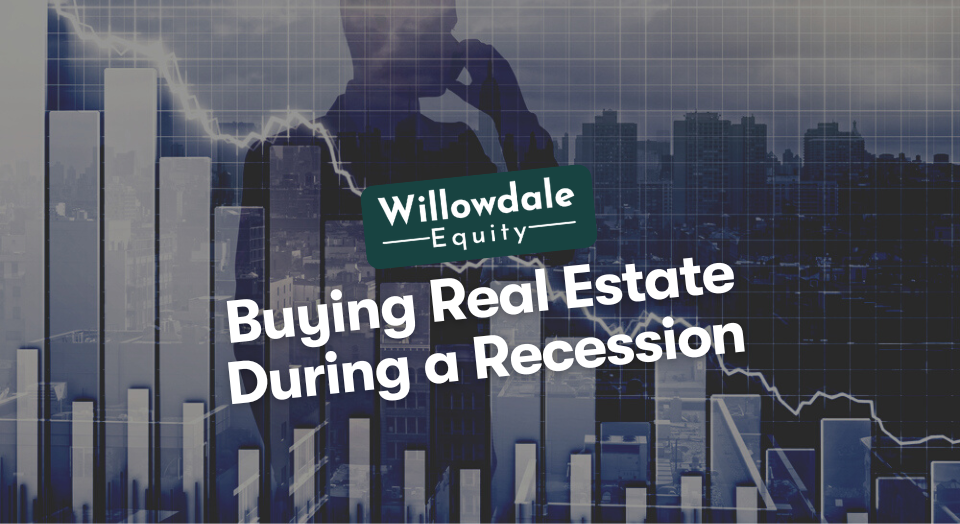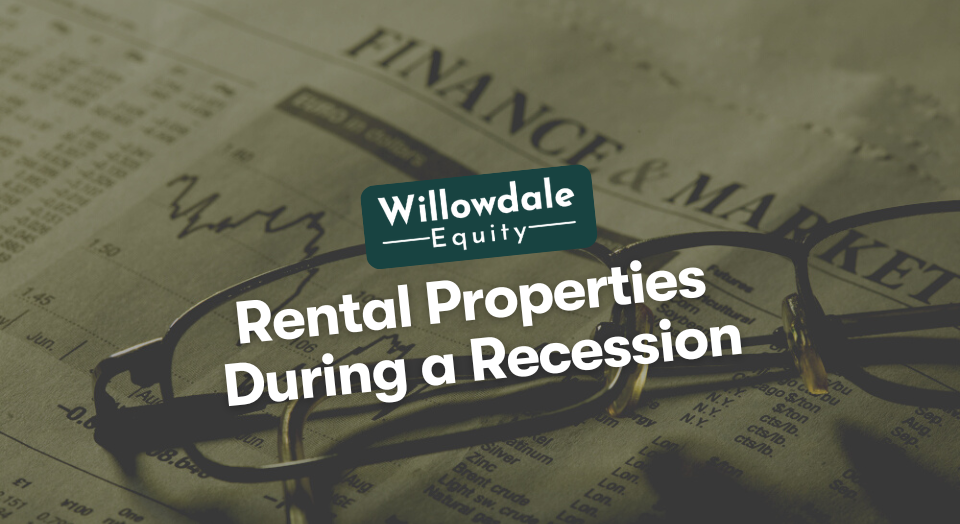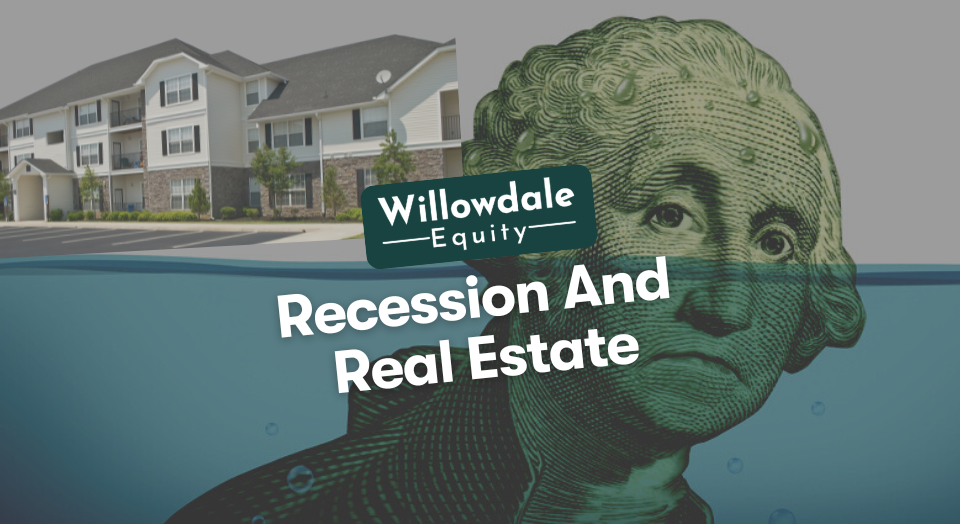
Buying Real Estate During Recession: What You Need to Know
If home prices fall briefly during a recession, your investment portfolio’s value can suffer. Although not always desirable, economic downturns can present opportunities for wise real estate investors. It’s crucial to have a plan for optimizing profits if you’re considering real estate investing during a recession or you currently have rental property.
In this article, we’ll go through some essential information about buying real estate during a recession, including what a recession entails and the events that occurred during previous recessions. We’ll also highlight why focusing on cash-flowing real estate assets is critical.
Key Takeaways
-
Although recessions frequently drive buyers away from the buyer’s market, this does not necessarily mean it is a terrible time to buy. If you can afford it, buying a property during a recession can be an excellent decision.
-
Homes typically stay on the market longer during a recession since there are typically fewer purchasers. Making their home less challenging to sell increases sellers’ likelihood of reducing their listed housing prices. Even with a house at an auction, you might strike it lucky.
-
Lenders may impose stricter mortgage restrictions to protect their profits during a recession and reduce the likelihood that a borrower won’t be able to make mortgage payments.
What is a Recession?
A significant, pervasive, and protracted decline in economic activity is referred to as a recession. A recession is often defined as two-quarters of a declining gross domestic product (GDP). Total production, consumer demand, and employment all often experience declines during recessions.
A contracting economy is a sign of a recession. People spend less money on non-essential products and more on necessities. To increase their bottom lines, businesses may stop employing new employees or start laying off existing ones. In the face of economic uncertainty, stock market values may decline.
Some of the most well-known recession periods that occurred in the recent past were the 2001 recession and the great depression of 2008. We will be going through the events of both in the following sections.
What Happened in the 2001 Recession?

After a full ten years of strong growth, the nation’s most prolonged postwar prosperity ended in 2001. Although frequently attributed to the dot-com bubble and fall, several other causes also contributed to this recession. The good thing is that it lasted only briefly, from March to November 2001, and was generally regarded as a mild recession.
Early contributors to the recession included falling vehicle sales and adverse international trade, but the decline in company investment—particularly in products related to information technology—became the dominating driver. More than 1.2 million jobs were lost by factories in 2001, which also saw a dramatic decline in output.
American automakers predicted a reduction in total demand for new vehicles as early as the late summer of 2000. In response, they reduced output and employment, firing 89,000 workers in 2001.
Due to the decline in demand, steel prices fell, and numerous American steel companies sought Chapter 11 bankruptcy protection. Like primary metals, domestic manufacturers’ and exporters’ demand for paper and related products fell. That sector cut 28,000 jobs.
Less capital was demanded, particularly for high-tech goods, and bookings for machines and computer equipment fell due to decreasing industrial earnings. The dot-com boom and bust followed. Online businesses crowded the market, eager to capitalize on the possibilities of the internet.
A few characteristics characterized the successful dot-coms of the late 1990s and early 2000s: they all professed to “transform the world,” had absurdly high values, and were outrageously unproductive.
When the internet emerged in the 1990s, there was a rush to buy any equities tied to it because the whole sector saw an exponential value increase.
People lost their sense of caution and interest in a company’s foundations as these stocks’ prices rose, preferring to get in at any cost.
As you can see, a lot of other variables combined to wreck the economy in 2001 and cause a recession in the process.
With the 2001 recession explained, let’s now discuss what happened during the 2008 great depression.
What Was the 2008 Great Recession All About?

In the 2000s, the United States experienced a period of economic deterioration known as the Great Recession. Amongst the most prolonged economic downturns since the 1930s, it was measured as having spanned from December 2007 to June 2009.
The U.S. housing market saw a sharp downturn during that time, GDP shrank by 4.3 percent, and unemployment rose from 5 percent in 2007 to 10 percent in 2009.
You’ll hear a lot of people say that the housing bubble burst was what started the Great Recession. The average home price in the U.S. increased by more than twice that amount between 1999 and 2006, one of the fastest ever recorded, as reported by the Federal Reserve. There was more to it than just the skyrocketing home prices, though they undoubtedly played a part.
A significant contributor was the banking sector’s lax rules that led to several dubious lending practices. With little to no money down, almost anyone could own a home. Mortgages and down payment criteria were eased in favor of less-qualified first-time purchasers.
In essence, mortgage lenders offered loans to customers who would have traditionally been a severe credit risk, and interest-only and adjustable-rate mortgages were preferred because of their lower initial monthly payments.
Banks bundled and sold their loans on the secondary market as mortgage-backed instruments. When they were all together, they didn’t seem as dangerous. Large investment firms bought these assets and later offered them as derivatives to willing buyers looking to make a profit.
The issue is that with rising interest rates, many borrowers were unable to make payments, and the housing market plummeted quickly.
In 2007, the housing bubble finally burst. Due to this, mortgage-backed assets had a severe devaluation, which ultimately caused Lehman Brothers and Bear Stearns to go under.
The Timeline Leading Up To The Great Recession

1999-2006
- The cost of housing in the U.S. doubled.
- Banks lowered the standards for borrowers seeking loans.
2006
- The Fed raises rates.
- Borrowers feel the burden of rising mortgage payments.
2007
- Due to mortgage defaults, banks start to go under and declare bankruptcy.
September 2007
- To reignite the American economy, the Fed lowers interest rates.
December 2007
- Unfortunately, rate reductions weren’t sufficient. The U.S. economy goes into recession, and the GDP starts to decline.
Let’s now look at another critical historical recession that occurred as recently as 2020.
The 2020 Recession Explained

The financial industry did not contribute to the 2020 Recession. The pandemic is thought to have caused this recession.
To stop the spread of the COVID-19 outbreak in March 2020, a large portion of the nation was placed under lockdown.
The results were felt right away. Spending fell, many businesses were shut down as they were deemed “non-essential,” travel was practically impossible, and hospital beds were filling up. For the initial three months of 2020, the GDP fell by 5%, and for the following three months, it fell by 31%.
And by April 2020, joblessness had reached 14.3%, which was a record high for the United States since 1948. Over 23 million workers were unemployed at the time.
Since no one was traveling then, it is no wonder that the leisure and hospitality sector experienced the highest losses in the job market. Still, every primary industry also experienced the loss of jobs.
The government immediately stepped in to assist what they perceived as a total economic collapse. With the passing of the Coronavirus Preparedness and Response Supplemental Appropriations Act on March 6, 2020, which comprised funds for small companies, among other things, government agencies got $8.3 billion in emergency assistance.
Soon after, the $3.5 billion Families First Coronavirus Response Act was passed, including tax breaks, paid medical leave, and workplace benefits.
But the state of the economy was so dire that the initial responses were just insufficient. The Coronavirus Aid, Relief, and Economic Security (CARES) Act, an over $2 trillion stimulus program providing immediate relief to families and businesses in the U.S., was approved by the U.S. government on March 27, 2020.
Unlike the 2001 and 2008 recessions, the housing market is not tied to the 2020 Recession. Although every recession will impact the housing market, this one hasn’t come to a complete halt as the significant subprime mortgage defaults did.
Home prices increased by 20% in 2021 compared to 2020, notwithstanding the financial toll that the pandemic took on many people. A decreased supply of properties, including investment properties, and increased demand, both of which can be ascribed to the pandemic, resulted in sharp increases in homebuyers’ expenses.
The good thing is that the 2020 recession did not last very long, as outlined in the next section.
Related Read: Recession-Proof Investments
How Long did the 2020 Recession Last?
The U.S. recession formally ended in April 2020, as reported by the National Bureau of Economic Research. Because of the CARES Act stimulus program, the GDP increased to around 34% in the third quarter (July, August, and September), but the unemployment rate stayed high.
With the addition of 1.4 million jobs, the unemployment rate decreased from 14.7% at its highest point during the recession to 8.4% in August 2020. Unemployment in 2022 is at a relatively low 3.6%, almost precisely matching the rate in February 2020.
Additionally, there were close to 11.4 million job opportunities as of April 2022, which indicates that the employment situation in the United States is intense for the time being.
Let’s now take a look at some of the pros and cons of buying commercial real estate and residential real estate during a recession.
Buying Real Estate During a Recession: Pros & Cons
Although recessions frequently drive buyers away from the buyer’s market, this does not necessarily mean it is a terrible time to buy. If you can afford it, buying a property during a recession can be an excellent decision. To help you make an informed choice, the following are the pros and cons of buying real estate during a recession.
Pros
- Lower prices
- Lower rates
- Less competition
Homes typically stay on the market longer during a recession since there are typically fewer purchasers. Making their home less challenging to sell increases sellers’ likelihood of reducing their listed housing prices. Even with a house at an auction, you might strike it lucky.
The Federal Reserve frequently lowers interest rates during a recession to boost the economy, leading to more benevolent terms for borrowers taking out home loans.
People are often in a tight financial situation following a recession, making it impossible to purchase a new house. Lower competitiveness occurs in the market for those who can still afford it.
Cons
- Economic uncertainty
- More stringent lending requirements
- Difficulty selling home
The vital point to remember is this. During a classic recession, unemployment rates spike, putting many positions at risk of reduction or termination. Things can change quickly, even if you believe your position or sector is stable. Also, remember that one expense associated with the property is the mortgage. Ensure your job security is your top priority if you don’t want to face foreclosure.
Lenders may impose stricter mortgage restrictions to protect their profits during a recession and reduce the likelihood that a borrower won’t be able to make mortgage payments.
During a recession, it could be challenging to acquire a new home if you first need to sell your old one. Your house might sell for a lower price than anticipated, or it can take longer to sell, subject to the local market.
With the pros and cons of buying investment property during a recession covered, it’s time to discuss why you need to focus on cash-flowing real estate assets.
Why You Need to Focus on Cashflowing Real Estate Assets
It is essential to own cash-flowing real estate assets, especially in turbulent/uncertain times. It doesn’t matter if real estate or home values fluctuate because you’re playing the long game. As long as you can stay cash flow positive, the property is paying you to stay there to receive the future gains years down the road when values pick back up and grow further.
With this in mind, the best real estate asset to buy is not single-family rental assets. Instead, the best real estate buy is multifamily real estate because it allows more diversification through a more significant number of tenants. So you’re not vulnerable to negative cash flow if one tenant vacates, as you will have many others that continue to pay rent.
Frequently Asked Questions about Buying Real Estate in a Recession
During a recession, it could be challenging to acquire a new home if you first need to sell your old one. Your house might sell for less than you anticipated, or it can take longer to sell, subject to the local market.
If a recession results in stagflation, real estate might serve as a hedge against inflation. Increasing joblessness and high inflation are indicators of stagflation. Property investment is more inflation-proof because prices often rise along with consumer prices.
Buying Property During Recession - Conclusion
It may make sense to purchase a property during a recession, but only for those privileged enough to maintain financial stability. With fewer purchasers and competition, home prices may decline as the Fed attempts to support the economy’s recovery.
Join the Investors Club at Willowdale Equity to learn more about investing in private risk-adjusted multifamily real estate during a recession.
Sources:
- Investopedia, “Recession: Meaning in Economics with Causes“
- Sound Dollar, “The 2001 Recession Explained“
- Sound Dollar, “The Great Recession Timeline“
Interested In Learning More About PASSIVE Real Estate Investing In Multifamily Properties?
Get Access to the FREE 5 Day PASSIVE Real Estate Investing Crash Course.
In this video crash course, you’ll learn everything you need to know from A to Z
about passive investing in multifamily real estate.
We’ll cover topics like earned income vs passive income, the tax advantages, why multifamily, inflation, how syndications work, and much much more!





